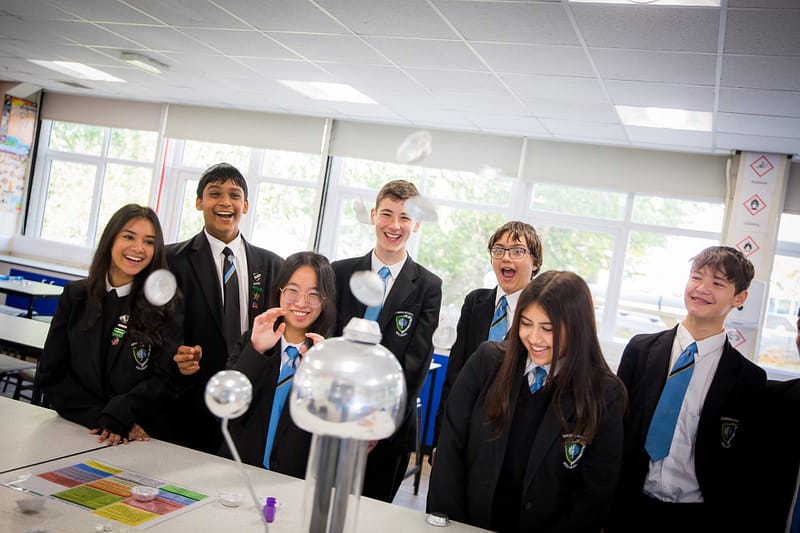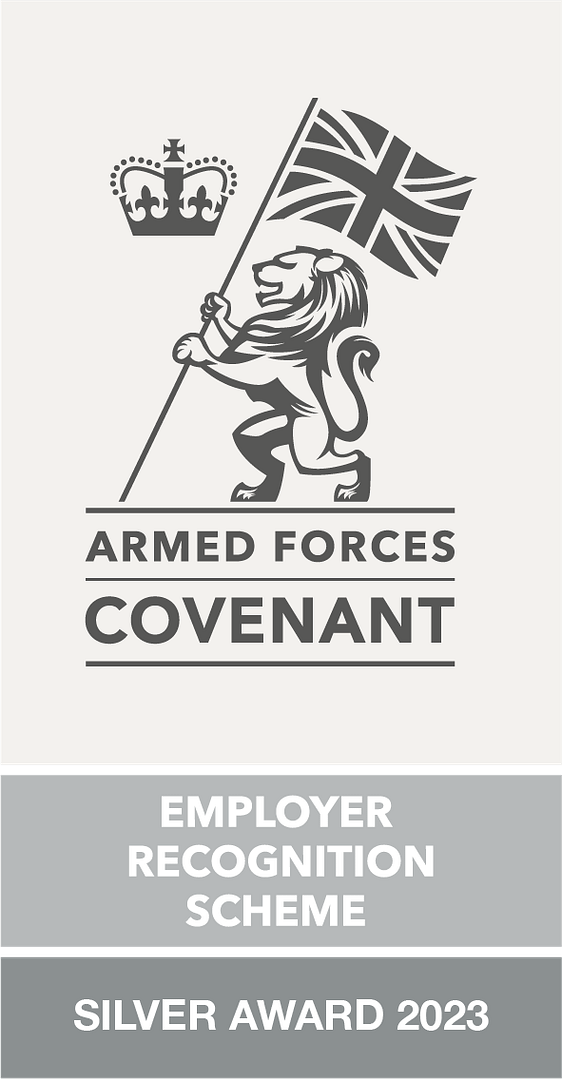The Summit Ogden Partnership: A Case Study
The Summit Learning Trust Partnership is currently in Year 2, having started formally in September 2022, but with some ‘Year 0’ planning activity having taken place the previous academic year. The Partnership is coordinated by secondary science teacher Natasha Peachey at Lyndon School. It is an ‘Established Collaboration’ cross-phase partnership, involving all seven academies that are part of the Summit Learning Trust. family This multi-academy trust (MAT) consists of four primary schools, three secondary schools and one sixth-form college, educating almost 8,000 learners. Across the secondary and sixth form phases there are many specialist teachers including Physicists.
Summit Learning Trust has its own Professional Learning Institute (PLI) which coordinates formal and informal training and development opportunities for all Summit staff members. The formation of the Ogden Partnership has provided new and exciting opportunities for collaboration, with cross-academy and cross-phase planning and development undertaken by colleagues from across our Summit Family. As part of the Trust’s emphasis on building a shared ethos and learner experience, the creation of the Partnership was initiated by Rebecca Lillington, Director of the PLI, in conjunction with Natasha.They saw an opportunity to upskill the non-specialist physics teachers and primary science teachers within the Trust as well as offering learners more STEM-related experiences.
What does this successful cross-phase, established collaboration partnership look like?
The Partnership has a strong focus on CPD, with teachers enthusiastically taking up the KS3 and Phizzi training opportunities, aided by promotion through the PLI. One of the primary academy teachers has taken responsibility for coordinating Phizzi CPD and training sessions have been arranged at different schools, rather than concentrating activity at the hub school.
The Partnership has been careful to ensure all activities for learners are tailored to all age groups. Teachers are empowered to deliver them in their schools at a time and a format that is most appropriate and have the agency to lead on Ogden activity within their academy.
The partnership works together to collaboratively plan opportunities and are flexible in how activities can be adapted for the different phases. [Partnership Teacher]
Responsibility for organising joint activities is shared as events are held at different schools or circulate around them. Many of these are focused on involving families, parents and carers, as well as being open to all from the local community, which has proved to be very popular. Senior leaders have been keen to attend, as part of their commitment to modelling positive behaviours to learners, like taking an interest in science.
It’s always really good for parents, carers and other subject teachers to see the importance that is being placed on science and discover what is out there [Rebecca Lillington, PLI Director]
The Partnership is now building up a set of event equipment, starting with Stargazing Boxes, which will be shared between schools. Some schools are trialling activities for one year with a view to others taking them up subsequently, like a Science Ambassadors scheme.
By applying for grants from other organisations which augment Ogden funding, it has been possible to deliver even more STEM-related activities, such as a mobile planetarium, organised via the partnership structure.
What factors help to create and sustain a partnership of this nature?
A key feature of successful cross-phase partnerships is having several schools from each phase involved, not just one ‘token’ primary or secondary. This ensures there is a critical mass of teachers from each Key Stage to participate in phase-specific training and activities together. It can avoid the situation where a group of primaries are all seeking support and resources from a single secondary school, or a lone primary is left out from activities aimed at older learners. Teachers can have conversations relevant to their own Key Stage at meetings and find common ground, which helps to foster a spirit of collegiality, builds peer support, and encourages the exchange of good practice.
In an ‘established collaboration’ partnership existing relationships between individual schools are an important consideration. Where these are cooperative, and teachers have a genuine desire to collaborate which is supported by Senior Leaders, it provides a solid foundation for partnership working.
A partnership can benefit immensely from linking into existing MAT structures, such as Summit Learning Trust’s Professional Learning Institute and cross-academy Lead Practitioner meetings which can raise awareness and feedback the benefits of partnership working to senior members of staff. Likewise, connecting partnership activities to trust-wide initiatives, e.g. a focus on literacy or numeracy, also helps to promote, involvement and support from colleagues and leaders.
What impact has belonging to an Ogden partnership had on the schools in it?
Connections with other teachers through partnership meetings and events have led to a growing awareness of other phases, helping teachers at all Key Stages understand what their learners need to prepare for and where they have come from.
The Partnership Coordinator has developed their leadership skills; been given more opportunities to promote Science across the schools; and delivered their own Ogden-inspired CPD, such as a session on the Physics of Climate Change at a whole-MAT session on Sustainability, organised by the PLI.
As a result of the CPD that they have taken part in, teachers report that they and their colleagues have increased confidence in teaching the curriculum and feel more skilled to use the resources provided. Partnership events have inspired ideas for practical lessons, new ways to approach topics, and shown how Physics links to real-life issues and STEM careers, thus enriching classroom teaching.
Learners have undoubtedly enjoyed the various partnership activities. Through them they have been exposed to new ideas, high-level concepts, and a wide range and diversity of jobs, stretching their knowledge of both the science and where it can lead them next. Teachers note that this has helped learners understand the importance of Science in their education.
Learners have seen how Science is relevant to their lives, and how through science and new technology they can discover so much more about the world and the Universe we are part of. [Partnership Teacher]
Senior leaders identify a ‘trickle-up’ effect from enrichment events, such as the planetarium visit. The increased enthusiasm of children and young people leads to greater interest in lessons and improved outcomes. In turn this can have a positive influence on teachers’ job satisfaction and retention, as does the good professional development they experience.
We really want to promote science and I think seeing the learners really engage with it does make a difference to colleagues’ job satisfaction. [Hub School Deputy Head]
Cross-phase partnerships within an established collaboration are in a unique situation where they can leverage existing structures for support and add real value. As Summit Learning Trust’s PLI Director notes: “The Ogden Partnership is a Trust-wide opportunity for people to get involved in and a great way of showcasing how we can work together cross phase. The amazing opportunities that come from it for our learners, for their families, for the teachers , have been really, really powerful.”.
Are there elements and learning that could apply to similar partnerships?
For other Partnerships
- In cross-phase partnerships, plan flexible activities which can be made relevant to the various age-groups. Ensure learners can take part at an appropriate level and all partnerships schools can be involved in some way. Think about which aspects of activities can be tailored to different Key Stages, such as how challenges are worded or what prizes are offered.
- Consider creating a Deputy Coordinator role (officially or unofficially) who is from a different school and phase to the Partnership Coordinator who can lead on phase-specific training etc.
- In ‘established collaboration’ partnerships, identify Trust/Federation-wide structures and foci which activities can be linked to. Identify those key leaders within the organisation who can amplify messages and advocate for the partnership.
- Think outside the physics box, identify other STEM initiatives and grants which can fund events, training or activities and use the partnership structure to organise these.
For the Ogden Trust
- ‘Spiral’ resources which link to the curriculum and show how concepts can be approached across different phases (like the ‘Wow How Now’ Rockets resource presented at the 2022 Teacher Conference) are extremely valuable for cross-phase partnerships to base activities on. More could be produced on different topics, such as Waves, or Light & Sound.
- When setting up an ‘established collaboration’ partnership, encourage applicants to make concrete links to MAT/MAC/Federation structures and foci and actively involve key senior personnel with links across the academies involved.
- Ensure cross-phase partnerships involve more than one establishment from each phase.
- The built-in time for planning and reporting at the annual conference is extremely helpful for Coordinators and they appreciate feeling valued and treated at Ogden events.
Additional Information
Partnership Background
The Summit Learning Trust academies are all located relatively close to each other within Birmingham and Solihull. Apart from the sixth form college, the academies are all situated in very deprived areas (IMD 1 or 2 1) and all have a much higher proportion of pupils receiving free school meals (between 35% & 60%) than the national average 2. Summit Learning Trust was formed in 2010 with the other schools gradually joining over the years. The seven academies have now been working together since 2017 when the Sixth Form College became the most recent establishment to join. All academies are now graded ‘Good’ by Ofsted, with outstanding features. In addition to high levels of free school meals and pupil premium, some academies also have significant numbers of pupils with English as an additional language.
1 Percentage of pupils receiving Free School Meals (FSM) in England is 23.8% according to the DfE School Census statistics for academic year 2022/23, published 8 June 2023: https://explore-education-statistics.service.gov.uk/find-statistics/school-pupils-and-their-characteristics [accessed 14th December 2023]
2 Indices of Multiple Deprivation (IMD) see: www.gov.uk/government/collections/english-indices-of-deprivation
Evaluation Methodology
The evaluation was based on a qualitative, open enquiry (grounded theory) approach, and used:
- Semi-structured Interviews with the Partnership Coordinator and Ogden Regional Representative (both via video call) and with the Assistant Principal at the Hub School and the Director of the Summit Professional Learning Institute (both in person).
- In person Observation of Partnership Meeting.
- Online, asynchronous ‘Focus Group’ (via Padlet) with Partnership Teachers, utilising an ‘Appreciative Inquiry’ & ‘Ripple Effect Mapping’

